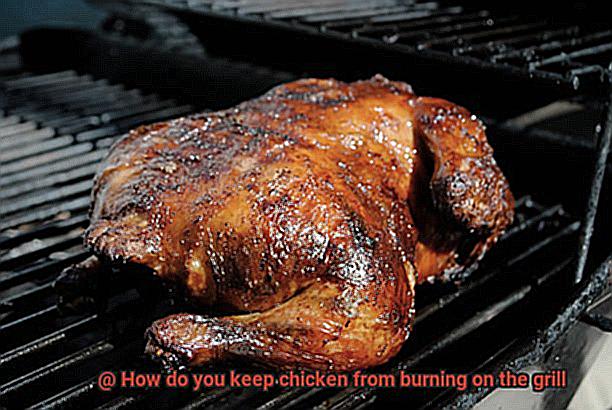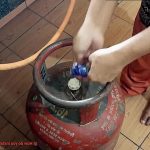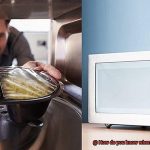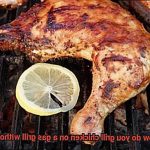Picture this: a warm, sunny day, the smell of charcoal in the air, and the sound of laughter and chatter in the background. You’ve got your chicken marinated and ready to grill, but as you flip it over, you notice it’s already starting to char. Don’t let burnt chicken ruin your perfect barbecue. With a few simple techniques, you can keep your chicken juicy and tender without any charring.
First things first: avoid high heat right out of the gate. Slow cooking and indirect heating are key to reducing the risk of burning. And don’t forget to marinate your chicken beforehand – not only does it add flavor, but it also helps prevent overcooking.
If you’re still worried about charring, invest in a meat thermometer to ensure that your chicken is cooked through without getting too crispy on the outside. Plus, keeping your chicken away from direct flames by using a drip tray or aluminum foil can make all the difference.
With these tips and tricks up your sleeve, grilling perfect chicken every time is a breeze. No more dry or charred pieces – just juicy and flavorful meat that will have everyone coming back for seconds (and maybe even thirds). So fire up that grill and get ready for some seriously delicious barbecue.
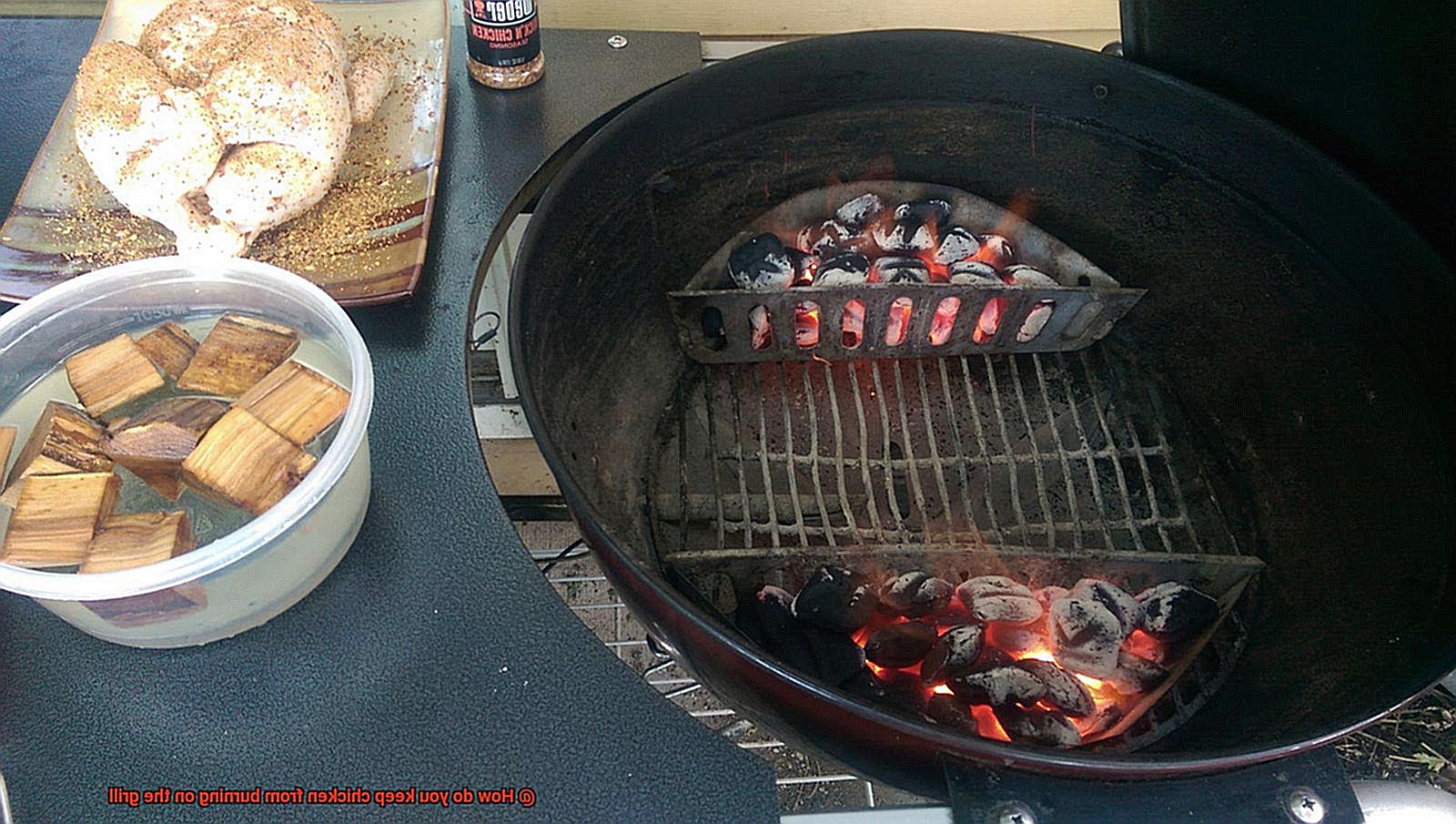
Contents
What Causes Chicken to Burn on the Grill?
Grilling chicken on a warm summer day is one of life’s greatest pleasures. However, nothing spoils the mood quite like burnt chicken. If you’ve ever wondered what causes chicken to burn on the grill, fear not. As an expert in this field, I have researched and found several factors that contribute to this problem.
One of the main culprits of burning chicken is the heat of the grill. If your grill is too hot, it can cause the chicken to cook unevenly or too quickly on the outside while remaining raw on the inside. This can lead to burning and leave you with unappetizing chicken. To prevent this, make sure your grill is preheated to the right temperature before cooking and adjust the heat as needed during cooking.
Another factor that can contribute to burning is the type of chicken being grilled. Chicken with skin on has a high-fat content, which can cause flare-ups and charring. Thin boneless chicken breasts are also more prone to burning because they cook quickly. To avoid burning, choose thicker cuts of chicken or opt for skinless varieties.
The marinade or seasoning used on your chicken can also play a role in burning. Sugary marinades or sauces will easily caramelize and burn on the grill, ruining your perfectly good piece of chicken. Instead, try marinating with low-sugar and high-acidity ingredients like citrus juice or vinegar.
To prevent your chicken from sticking to the grill and burning, clean and oil your grates before cooking. Additionally, don’t overcrowd your grill; leave some space between each piece of chicken to ensure even cooking.
Lastly, use a meat thermometer to check if your chicken is cooked through without overcooking it. This will help prevent burning and ensure that your chicken is safe to eat.
Clean and Oil the Grill Before Cooking
Starting with a clean and well-oiled grill is essential. As an expert on the topic, I recommend following these steps to ensure your chicken is cooked to perfection.
First, preheat your grill to a high temperature for at least 10-15 minutes. This high heat will burn off any leftover debris or grease from previous grilling sessions, preventing any unwanted flavors from affecting your chicken. Once the grill is hot, use a grill brush or scraper to remove any remaining debris or food particles from the grates.
Next, lightly coat the grates with vegetable or canola oil using a paper towel or cloth. The oil will create a non-stick surface and prevent the chicken from sticking to the grill. Be sure to use tongs to hold the paper towel or cloth and avoid burning your hands. Remember, over-oiling can lead to flare-ups and uneven cooking, so use a light hand when oiling the grates.
Keeping your grill clean and well-oiled is essential for even cooking and preventing burnt chicken. But what else can you do to ensure perfectly grilled chicken? Here are some additional tips:
- Choose thick cuts or skinless varieties of chicken to ensure even cooking
- Marinate your chicken with low-sugar and high-acidity ingredients like citrus juice or vinegar for added flavor and tenderness
- Leave space between each piece of chicken on the grill to ensure even cooking
- Use a meat thermometer to ensure safe and delicious eating
Preheat the Grill for Even Cooking
If so, the key is preheating your grill. As an experienced grill master, I can tell you that preheating is critical to achieving perfectly cooked chicken without any burnt or charred spots.
So, why is preheating so important? Let me explain.
Firstly, preheating ensures that the grates are hot enough to sear the chicken. Searing creates that mouthwatering crust on the outside while keeping the meat tender and juicy on the inside.
Secondly, preheating prevents your chicken from sticking to the grates. No one wants their chicken left behind on the grill. By allowing your grill to heat up, any leftover food debris will burn off and create a non-stick surface for your chicken.
Now that you know why preheating is essential let’s dive into some tips to get it right.
Start by turning on your grill to the desired temperature and let it heat up for at least 10-15 minutes. During this time, you can prepare your chicken by seasoning it with your favorite herbs and spices or marinating it for added flavor. When the grill is heated, use a wire brush to clean the grates and lightly oil them to prevent sticking.
When placing the chicken on the grill, lay it down gently. Avoid pressing down on it as this can cause flare-ups and uneven cooking. Close the lid of the grill to trap in heat and allow for even cooking.
It’s crucial to keep an eye on your chicken while it cooks and flip it every 5-7 minutes to ensure both sides cook evenly. Use a meat thermometer to check that it reaches an internal temperature of 165°F before removing it from the grill.
Avoid Crowding the Grill
Giving your chicken enough space on the grill is crucial for even cooking and avoiding burnt spots. But why is crowding the grill such a big no-no?
Firstly, overcrowding your grill can make it challenging to control the temperature. When too many pieces of chicken are crammed onto the grill at once, they can block the flow of heat and cause some pieces to cook faster than others. This leads to unevenly cooked chicken that’s either underdone or overcooked, which can be disappointing.
But that’s not all – overcrowding can also cause flare-ups, which can result in charred or burnt pieces of meat. When fat or other liquids drip onto the hot coals or burners, flames can shoot up and scorch your chicken, ruining its taste and texture.
To avoid these issues, it’s crucial to leave enough space between each piece of chicken. Depending on the size of your grill, this may mean only cooking a few pieces at a time. By doing so, you’ll ensure that all pieces cook evenly and thoroughly without burning or sticking together.
If you’re worried about keeping your chicken warm while you cook the rest, simply transfer it to a baking sheet lined with foil and cover with another sheet of foil. This will keep it warm without sacrificing flavor or texture.
To prevent smaller pieces from falling through the grates and sticking together, use skewers or a grill basket. This will allow you to cook several small pieces at once without crowding the grill.
Use a Meat Thermometer to Prevent Overcooking
Grilling chicken can be a daunting task, especially when you want to avoid overcooking it. Dry and tough chicken is unappetizing and can ruin your whole meal. Luckily, there’s a simple solution to this problem – using a meat thermometer.
A meat thermometer is an essential tool for grilling chicken. It not only helps prevent overcooking but also ensures that your chicken is cooked to a safe temperature. Here’s why using a meat thermometer is crucial for perfectly cooked grilled chicken:
Prevents Overcooking: When it comes to grilling chicken, the internal temperature is the key factor. If you cook the chicken for too long, it becomes dry and difficult to chew. A meat thermometer allows you to check the internal temperature of the chicken and ensure that it’s cooked just right. Insert the thermometer into the thickest part of the chicken, wait for a few seconds until the temperature reading stabilizes, and if it’s below 165°F (74°C), continue cooking until it reaches the recommended temperature.
Ensures Safety: Cooking chicken to the appropriate internal temperature is vital for food safety. According to USDA guidelines, chicken must be cooked to an internal temperature of 165°F (74°C) to kill any harmful bacteria that may be present. Using a meat thermometer helps you verify that your chicken has reached this temperature, ensuring that it’s safe to eat.
Easy to Use: Using a meat thermometer may seem like an extra step, but it’s simple to use. Insert the thermometer into the thickest part of the chicken, making sure not to touch any bones. Wait for a few seconds until the temperature reading stabilizes, and then remove the thermometer from the chicken. If it’s under 165°F (74°C), continue cooking until it reaches the recommended temperature.
Marinating Chicken Before Grilling
Marinating your chicken before grilling is the secret to achieving tender, juicy, and flavorful results. As an expert in this area, let me share with you the benefits of marinating your chicken before it hits the grill.
Marinating chicken is not only a flavor enhancer but also a tenderizer. The acidic ingredient in the marinade, such as vinegar or lemon juice, helps break down the proteins in the chicken, making it more tender and easier to cook. Additionally, oil in the marinade acts as a barrier between the chicken and the grill grates, preventing it from sticking and creating a crispy outer layer to your chicken.
But why stop there? Marinades can be customized to taste by adding herbs, spices or even fruit juices to create a unique and delicious flavor that will make everyone at your next barbecue ask for seconds.
To begin marinating your chicken, mix all of your desired ingredients together, place the chicken in a large zip-lock bag, pour the marinade over it, and refrigerate for at least 30 minutes or up to 24 hours. However, be cautious not to leave it too long in the marinade or else it could lose its texture and become mushy.
When it’s time to grill your marinated chicken, remove it from the marinade and wipe off any excess liquid. This will prevent flare-ups and charring on the grill.
In summary, marinating your chicken before grilling is an easy way to prevent burning while also adding flavor and moisture to your dish. To make things easier for you, here are some tips:
- Always use an acidic ingredient in your marinade.
- Customize your marinade with herbs, spices or fruit juice.
- Refrigerate your chicken for at least 30 minutes but not longer than 24 hours.
- Wipe off excess marinade before placing it on the grill.
Use Indirect Heat for Thicker Pieces of Chicken
As a grilling guru, I know the importance of perfectly cooked chicken. However, when it comes to thicker cuts, the fear of burnt exteriors or raw insides can be daunting. But fear not, my friends. The solution is simple: indirect heat.
Indirect heat is the key to ensuring your thicker pieces of chicken are succulent and juicy without overcooking the outside. By placing the chicken in a cooler area of the grill, it will cook more slowly and evenly.
To set up your grill for indirect heat, create two zones: one with direct heat, and one with indirect heat. On a charcoal grill, place all of the hot coals on one side and leave the other side empty. For a gas grill, turn off burners on one side and keep the other side on.
Once your grill is set up for indirect heat, place your thicker pieces of chicken on the cooler side. To avoid flare-ups, consider using a drip pan to catch any marinade or juices that may drip down.
Using indirect heat takes longer than grilling over direct heat, but the payoff is worth it. You’ll have tender, juicy chicken that’s cooked all the way through. Be sure to check the temperature periodically with a meat thermometer to ensure your chicken is fully cooked.
Monitor Temperature and Move Pieces Around as Needed
Grilling chicken can be a daunting task, but with the right techniques, you can make it look effortless. One of the most crucial things to keep in mind is monitoring the temperature of your grill and moving pieces around as needed to achieve an even cook. Here are some tips to help you get it right every time.
To begin, ensure that your grill is preheated to the correct temperature. For charcoal grills, wait until the coals turn white before cooking. For gas grills, preheat to medium-high heat and reduce to medium when you’re ready to cook.
Once your grill is heated up, it’s time to start cooking. Place your chicken on the grill and keep an eye on the temperature. If things start getting too hot, move your chicken to a cooler spot or raise the grate higher above the coals. On the other hand, if things are too cool, add more coals or move your chicken closer to the heat source.
However, temperature isn’t the only thing you need to monitor. It’s also essential to watch how your chicken is cooking. Here are some additional tips:
- Rotate your chicken periodically for even cooking.
- Keep a spray bottle of water nearby in case of flare-ups.
- Use a meat thermometer to ensure that the center of the chicken reaches 165°F.
But what about pieces of chicken that are different sizes? Thicker pieces may need to be moved closer to the heat source to ensure they cook evenly, while smaller or thinner pieces may need to be moved away from direct heat to prevent burning.
T_oB4vQXGuI” >
Also Read: Gas Grill Gets Too Hot on Low Setting
Conclusion
In conclusion, grilling chicken may seem intimidating, but with the right techniques, it can be a breeze. To avoid burnt chicken, it’s crucial to keep an eye on your grill’s temperature and move pieces around as needed for even cooking. Don’t start with high heat right away; instead, gradually increase the temperature as you cook.
Investing in a meat thermometer is also essential to ensure that your chicken is cooked through without getting too crispy on the outside. Using a drip tray or aluminum foil to keep your chicken away from direct flames can help prevent burning as well.
Before cooking, make sure to clean and oil your grill for even cooking and to prevent sticking. Overcrowding your grill can lead to uneven cooking, so leave some space between each piece of chicken. For thicker cuts of chicken, use indirect heat and monitor the temperature closely.
Marinating your chicken before grilling not only adds flavor but also helps prevent burning by keeping the meat moist. Finally, use a meat thermometer to check if your chicken is cooked through without overcooking it.

